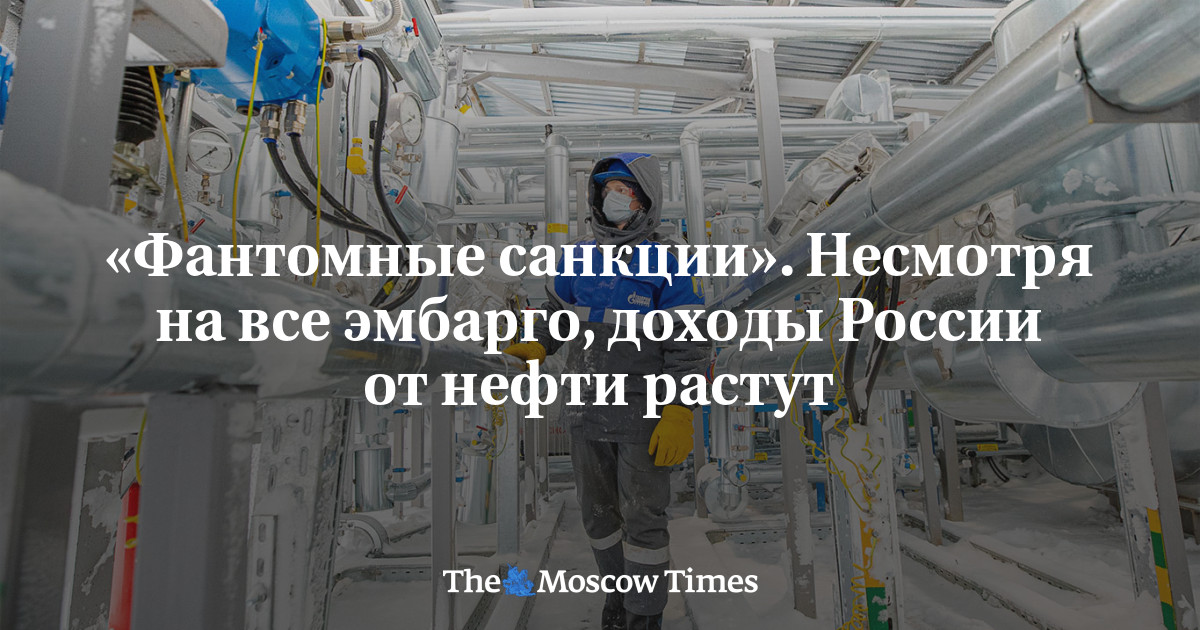Western sanctions on Russian fossil fuels are a phantom. Revenues flowing into the Kremlin treasury from foreign sales of oil, gas and coal are sky-high: they doubled in the first 100 days of the war.
Western energy sanctions are not working. For a very simple reason – they don’t exist.
Before Vladimir Putin’s full-scale invasion of Ukraine in February, Russia was comfortably the world’s largest exporter of fossil fuels. Today it can sell oil, gas and coal directly to any country except the United States, which was not the most significant buyer in the past.
Some influential American and European observers argue that restrictions on Russian oil exports inconvenience ordinary citizens in Western countries but do not reduce the Kremlin’s revenues. They argue that Western sanctions have had the opposite effect.
However, the measures taken by the West so far cover less than 5% of Russia’s pre-war crude oil exports. Seaborne oil exports, although down since mid-June, remain higher than at the start of the invasion. This is largely due to the fact that imports of Russian oil into the EU and UK will remain legal until at least December. Between 10 and 20 million barrels of crude oil arrive from Russian ports in Europe every week as traders turn the so-called “phase-out” into a mad race to make money.
Even in the United States, the only country where sanctions have been imposed on the direct import of Russian oil, motorists, perhaps without knowing it, continue to fill the tanks of their cars with Russian-made gasoline.
In what can only be described as a global laundering operation, Russian oil is shipped to foreign refineries and then imported into the United States as gasoline.
Once oil is refined into other products, it can be legally imported into the United States without violating sanctions.
The UK also intends to continue importing millions of barrels of Russian blended oil in the coming months. This trade is likely to continue even after the UK ban comes into force later this year. This will be possible thanks to clauses in the rules that will allow companies to import CPC Blend, a crude oil that is a mixture of Kazakh and Russian products transported through the Caspian Sea pipeline.
It’s hardly the embargo Americans and Britons might have hoped for when President Joe Biden and outgoing British Prime Minister Boris Johnson announced punitive measures in March. Failure to implement a true embargo on Russian oil and gas increases Putin’s income and funds war crimes in Ukraine.
To some extent, today’s high energy prices reflect traders’ expectation that restrictions on Russian oil will be introduced in the future. But crude oil prices had been rising for months before the invasion and before the West announced any sanctions.
Moreover, West Texas Intermediate and Brent crude oil prices have fallen steadily since early June, just as crude oil exports from Russia began to decline. The claim that current oil prices are the result of restrictions imposed by Western governments on Russian fossil fuel exports does not hold water.
The big energy companies, which have made huge profits over the past six months, bear much more responsibility for the pain energy consumers are experiencing. Companies such as BP and Shell in the UK, which earned $8.5 billion and $11.5 billion respectively from April to June, and Wintershall in Germany, which earned $1.9 billion, are doing very well, but these profits are nothing -new for the industry. This is a sector that has made staggering profits every day for the last 50 years.
EU and UK policymakers have eased existing restrictions in recent days. Without giving the sanctions a chance to work, they are dismantled. This benefits Putin even as his troops commit atrocities in Ukraine and Russia expands the territorial targets of its illegal war.
Ukraine will never forget the support that our partners gave us. But when it comes to fossil fuels, the West faces a clear choice. Anyone serious about supporting Ukraine should stop funding the Putin regime. Business as usual serves only to prolong the war that has crippled the entire world economy.
The most effective solution would include a full and immediate embargo on Russian fossil fuels in Europe and the rapid implementation of G7 proposals for a global price cap on Russian oil.
The sooner Putin is stopped, the sooner we can continue rebuilding Ukraine. This means leaving Russian fuel in the ground and turning phantom energy sanctions into real ones.

